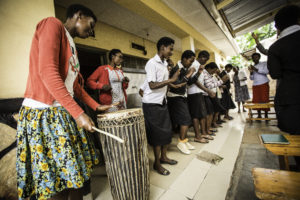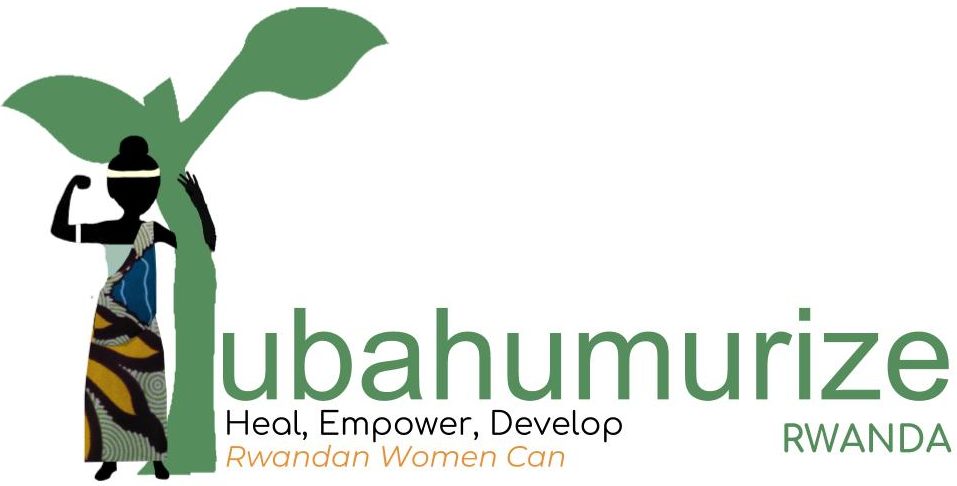8 March 2015
Note: This reflective piece was originally posted elsewhere in order to introduce a wider audience to Tubahumurize.
Happy International Women’s Day!

Tubahumurize sewing and embroidery students singing at the start of the day
For the past six weeks, I have woken up each morning to the beautiful sound of forty young women singing a capella outside my bedroom window here at the Tubahumurize Centre.
This is how the members of the Tubahumurize sewing and embroidery co-operative in Kigali, Rwanda, start each busy workday: standing in a close circle, eyes closed, clapping their hands, swaying back and forth, and singing. Although I don’t understand all the lyrics, I know that their songs are expressions of praise and gratitude.
This International Women’s Day, I want to shine a light on these amazing women and the association that unites them. For me, this important day isn’t about us women “leaning in” to claim a bigger share of the corporate power-pie. Instead, it is a chance to reflect on the tremendous courage, dignity, and strength of ordinary women the world over who are banding together to improve their lives and communities.
Tubahumurize is a grassroots organization dedicated to empowering Rwandan women victims of violence. I came to know it because I have the remarkable good fortune of being the daughter-in-law of its founder and director, Jeanne Mwiliriza.
Over the past six years, I’ve had the honour of supporting this organization as a volunteer and, more recently, as a Board Member. My involvement, which began with a 6-month volunteering stint in 2009, has given me an insider’s perspective into its unique approach to healing and empowerment as well as a deeper appreciation of women’s resilience and dignity.
“Tubahumurize” is a Kinyarwanda word that roughly translates to “Let us console and give them hope.” The Association’s mission is to support and empower some of Rwandan society’s most vulnerable members: women victims of violence. Its constituents are survivors of either domestic violence or of genocide (or, as is all too often the case, of both.) Most are socially and economically marginalized and many are also HIV positive.
About the Founder
The journey that led my mother-in-law to create Tubahumurize is in itself amazing. In 1994, as a young mother of three, Jeanne survived the genocide. About 90 percent of Rwanda’s targeted Tutsi population was “successfully” exterminated within a 3-month period, so her survival – like that of my husband and every other survivor – was the result of an extremely unlikely alignment of coincidences. Jeanne was marched to the edge of a mass grave for execution no less than seven times. Each time, she managed to take advantage of outside circumstances to escape.
Her husband, who was a family doctor specialized in women’s reproductive health, was killed during the genocide. As a new widow, Jeanne began to meet informally with other women survivors, many of whom were also widowed. They banded together for moral and practical support. Jeanne talks about that period as extremely uncertain; survivors were in shock and busy trying to put in place the practical elements of life: a place to live, work, some predictability after so much horror and loss.
Then, ten years after the genocide, Jeanne’s childhood friend was murdered by her husband. Jeanne was struck with grief and the sense that she could have done more to help her friend. She resolved to devote her life to empowering women victims of violence and to helping to prevent similar tragedies, and founded Tubahumurize to empower women victims of any form of violence.
For the past ten years, Jeanne has dedicated her energy to helping women to overcome the trauma and degradation caused by violence and to build better futures for themselves and their families. As of now, over 800 women have been helped by the Association, which currently serves about 450 women and, indirectly, also benefits around 1, 050 of their dependent children.
Women Genocide Survivors
About two thirds of Tubahumurize’s current members are survivors of the 1994 Genocide against Tutsi in Rwanda. To be a survivor of this genocide is to have witnessed extreme violence. Women were often forced to watch as their entire families were murdered before their eyes. Today, they live with the trauma of those memories.
Most women also experienced sexual violence during the genocide, as Tutsi women were systematically targeted for rape, mutilation, and sexual slavery. The U.N. Special Rapporteur on Human Rights, Rene Degni-Segui, concluded in 1996 that “rape was the rule and its absence the exception” during the genocide.
Even more obscene is the fact that during the conflict, militia intentionally infected women with the HIV virus. Reports indicate that genocide organizers assembled AIDS patients and others known to be HIV positive and formed them into “rape squads”. The intent was to infect and cause a “slow, inexorable death” to targeted women and to wipe out their line of progeny.
Only now, twenty years after the genocide, are many women beginning to speak about the violence and humiliation they experienced. I recently wrote this article after sitting in on a trauma counselling session for a group of women raising children born of rape. (Note that it may be a difficult read for some.)
Obviously, after what they have endured, it is hard to imagine that any intervention (legal, social, or economic) could even begin to restore justice to their lives. And yet, they carry on: raising families, working, and supporting one another as members of Tubahumurize.
In awe of their amazing resilience, I once asked a group of women survivors from where they drew their strength. They answered almost unanimously that it comes from their faith in God. One woman added with a smile that she has made it her goal to be happy and to raise a happy family, because she considers that to be the best form of revenge against those who sought to exterminate her. Over the course of the ten or so Tubahumurize counselling sessions with genocide survivors that I’ve observed since 2009, this woman’s defiance is the closest thing I’ve ever seen to anger. I’ve often wondered where the anger is.
Women Victims of Domestic Violence
The Association also serves women victims of domestic violence in Kigali. Statistics on the prevalence of domestic violence in Rwanda are scarce but alarming. In a 2010 government survey, 56% of married Rwandan women reported having experienced violence in the past 12 months. Anecdotal evidence suggests that rates of domestic abuse spiked dramatically over the last twenty years. Some speculate that this is a reverberation of the extreme violence that was “unleashed” during the genocide. I would love to investigate this theory further one day.
I was shocked to read in a recent report by Rwanda’s National Institute of Statistics that over twenty percent of Rwandan women believe that their husbands are justified in beating them for minor offenses, including burning supper. This indicates a highly problematic social tolerance for violence against women. The problem of domestic violence is compounded by both men and women’s lack of education about women’s rights, social isolation, and poverty.
Tubahumurize aims to address these challenges holistically. The ability to earn an income is essential, as it raises women’s status in the home, which they can leverage to demand better treatment (or, when necessary, to leave). By reducing women’s economic dependence upon men, Tubahumurize aims to empower women to put an end to the cycles of domestic violence that harm them and their children.
From Healing to Empowerment
Whether women are survivors of domestic abuse or genocide, all come to the Association traumatised by the violence they have experienced and often in crisis. To help meet their diverse needs, Tubahumurize runs a suite of programs that supports women in a journey from healing to empowerment. The individual and group trauma counseling programs are a necessary beginning, but not the end, of this journey.
As women’s mental health improves, they begin to participate in the Association’s other programs, designed to empower them to take charge of their lives in new ways. This includes educational workshops, access to micro-financing for small business ventures, a Sewing and Embroidery School, and the Tubahumurize Co-operative.
The Co-Op
The Tubahumurize Co-operative is comprised of twenty-five graduates of the Sewing and Embroidery School. Many members are children of the Association’s older beneficiaries, while others are orphans or former sex workers. Many are heads of households. Some are children born of rape. All were unable to complete their educations and come from difficult circumstances.
The co-op members share the profits, which they use to build better lives for themselves and for their families. Business has peaks and troughs, but is reliable enough to provide income year-round, reducing the very real pressure to seek out riskier forms of income generation.
The Tubahumurize Co-op is known to expatriates in Kigali as the go-to spot for gorgeous hand-made quilts in vibrant African prints. The women also create lovely dolls, tablecloths, and a large selection of other household items. The products are mostly made using kitenge (African printed cloths) for both a domestic and an international market.
For instance, when I first arrived at the Centre in January, the co-op was working overtime to fill an order for 300 brightly coloured laptop bags for a partner organization: an association of Rwandan men against gender-based violence. (And I was very glad to know that this association exists!)
During my recent visit, I loved walking into Tubahumurize’s busy co-op shop, where I would find the women quilting together in a large patch of sunshine on the floor, or seated at their sewing machines, chatting and laughing easily with one another as they worked. I was travelling this time with a little baby. Like almost all Rwandan women I met on this trip, the women of the co-op would immediately whisk my infant out of my arms, smother him with kisses, and dance him around the workshop. I loved their warmth, and so did he.
Spending time with these women, it became clear to me that their empowerment stems not only from the revenue that they earn through sales (though this helps a lot) or from their participation in the Association’s educational workshops (though these are also useful), but also from the strong, supportive community that they have built together.
Although I developed a friendly relationship with many of the women of the Association, I wish I had found the words to tell them how strong they seem to me, and how inspiring. These women, who have suffered so much and yet start every morning singing songs of gratitude, have motivated me to cultivate more gratitude in my own life.
Moreover, they have shown me that we have far more power than I once believed: we can choose, despite our pasts and our circumstances, to be grateful, generous, kind, brave, strong, joyful, and hopeful. And when we choose to come together, our collective power can transform our circumstances for ourselves and for our communities. This work is neither easy nor simple, and it is far from over, but I believe it is possible.
So whether you’re dressed in a power suit or wrapped in a kitenge, I wish you a wonderful Women’s Day and a year of self-transformation and collective transformation!
